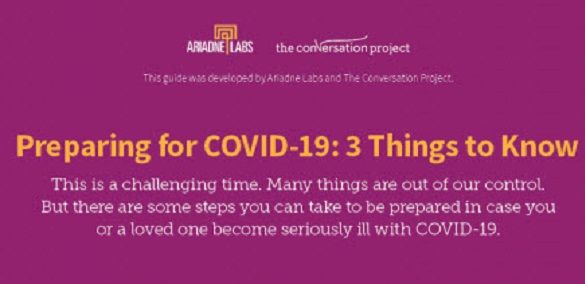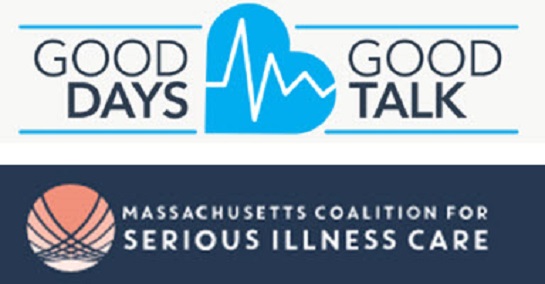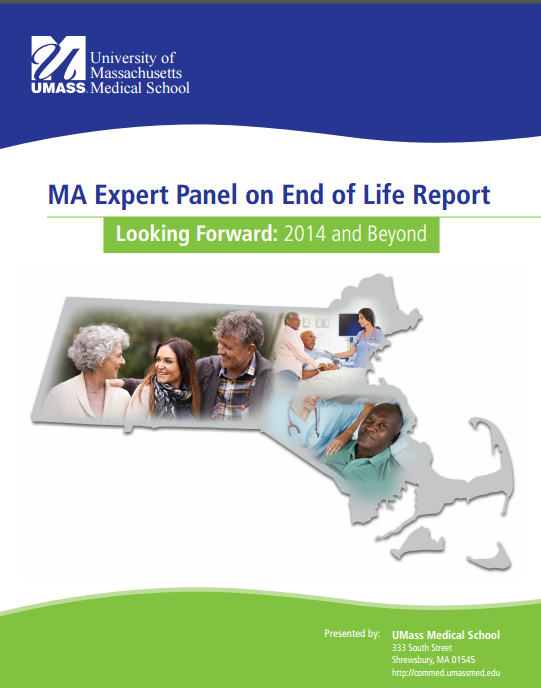MOLST Project
MOLST is a standardized medical order form for use by clinicians caring for patients with serious advancing illnesses. Effective July 1, 2014, the MOLST Project will transition to the MA Department of Public Health.
Report and Recommendation of the Massachusetts Expert Panel on End-of-Life (EOL) Care
This report describes the many gaps in EOL care. The EOL Expert Panel has identified, and makes recommendations for both immediate and long-term steps that must be taken to address them.
Artificial Nutrition and Hydration:
Patients and families are often not fully informed of the relevant risks and potential benefits of artificial nutrition and hydration (ANH). In addition, financial incentives and regulatory concerns promote the use of ANH in a manner that may be inconsistent with medical evidence and with the preferences of patients and their families.
Because ANH is associated with uncertain benefits and substantial risks, it is essential to ensure that decisions about its use are consistent with the patient's medical condition, prognosis, and goals for care. Therefore, decisions about ANH require careful consideration of its risks and potential benefits.
Advance Planning:
All adults can benefit from thinking about what their healthcare choices would be if they are unable to speak for themselves. These decisions can be written down in an advance directive so that others know what they are.
Advance directives come in two main forms:
- A "healthcare proxy" (or "healthcare power of attorney" or "agent" or "surrogate") documents the person you select to be your voice for your healthcare decisions if you cannot speak for yourself. In Massachusetts the
healthcare proxy has full legal authority to act on behalf of the patient in all healthcare planning decisions. - A "living will" documents what kinds of medical treatments you would or would not want at the end of life. In Massachusetts, a living will does not have full legal authority but is a good document to have so that the healthcare provider is aware of the patient's wishes. However, all patients should have a valid healthcare proxy on file with their healthcare provider or available for their healthcare provider.
Massachusetts residents can document decisions regarding their healthcare choices and designate another individual to make healthcare decisions on their behalf through a HealthCare Proxy. You can find two sample Massachusetts HealthCare Proxies below:
Detailed HealthCare Proxy - this document provides a full set of legal protections that are not necessarily required in a form but is provided so the patient/provider may consider if there is relevant language to use in your own facility-specific proxy form.

Being Prepared in the Time of COVID-19
With generous support from the Cambia Health Foundation, Ariadne Labs and The Conversation Project have developed a patient-facing guide on Being Prepared in the Time of COVID-19. This tool can help people take action and be prepared for the pandemic. Read more... ...» Full Article
MA Coalition for Serious Illness Care – Good Talk Campaign
Based on the Coalition’s public messaging research, we have developed the Good Talk Toolkit to be a resource that supplements your organization’s capacity to build awareness and understanding for advance care planning. The messaging and campaign included here are intended to shift the frame of advance care planning away from end of life and life-sustaining treatment choices towards goals of c...» Full Article
What is Palliative Care?”
Webinar Recording (Time: 5 minutes) - For Everyone: Learn why Palliative Care is an added layer of support for individuals with serious illness- at any age, any serious illness, and any phase of health. ...» Full Article
For Consumers: “Palliative Care: Aligning the Team Around the Patient”
Webinar Recording (Time: 30 minutes) - For Consumers, Patients, Families and Caregivers can explore Palliative Care and learn key questions to start a discussion with your care providers. Elizabeth J.Collins, MD, Palliative Care Medical Director, Lahey Hospital & Medical Center, provides a framework of the 5 stages of serious illness and how palliative care can be effective at each stage and...» Full Article
Palliative Care Discussion Guide: 5 Things to Talk About with Your Care Providers
This is a Basic Discussion Guide to help you start a planning discussion to promote lifelong wellness and receive person-centered care. Start with one or more questions that make sense to you, and write down your own questions below to bring to your next appointment. I’d like to understand more about my health or illness and treatment optionsI want to discuss my goals and explore the care I ...» Full Article
Palliative Care for Consumers – Fact Sheet
Palliative Care is specialized health care for individuals diagnosed with a serious illness to manage the pain, symptoms and stress of living with a serious illness. A Palliative Care clinician or a team of care providers, offer an “extra layer of support” in addition to your regular medical care. They can provide emotional and spiritual support for you and your family. Palliative care impr...» Full Article
Honoring Choices “Everyone, Everyday” Initiative
Make a plan for quality care today & everyday. The "Everyone, Everyday" initiative reaches out to all adults to make a personal health care plan within their own language, culture and ability, and receive the best possible care today and everyday, starting at 18 years old and continuing all through their lifetime. Make Your Plan. Then, Help Move it Forward! You can start to make your own p...» Full ArticleTranslate »



